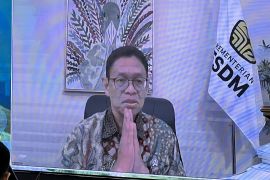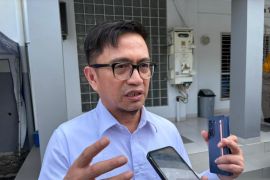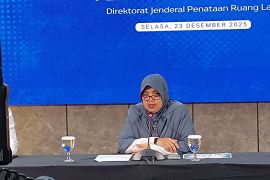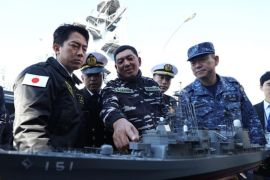Leaving the prison in a van belonging to the Corruption Eradication Commission (KPK), Rumajar wore a batik shirt but changed into the all-white mayoral custume as soon as he arrived at the Home Affairs Ministry on Friday last week. The hall where the ceremony was to take place was fully packed with well-wishers, politicians and civil servants.
North Sulawesi Governor Sinyo Harry Sarundayang, on behalf of the President, presided over the installation ceremony that lasted briefly but still gave him an opportunity to hold a meeting with his mayoral subordinates afterward. Rumajar won the Tomhon mayoral election for the 2010-2015 period. Tomohon is a small city 22 kms from Manado, capital of North Sulawesi province.
Along with Vice-Mayor-elect Jimmy Eman, Rumajar went through all the formalities of the installation ceremony, including taking an oath in which pledged to shun corruption, the very thing for which he is facing prosecution. The corruption court has been hearing his case since early December last year.
"The carriages of administration must move on, whoever is not within the system, must get out," Rumajar said when installing a number of Tomhon municipal officials after his own installation at the Home Ministry. He said his administration in Tomohon from now on would be led by his deputy as he was required to return to Cipinang prison.
The KPK had named Rumajar a suspect in the misappropriation of the city`s budget when he was serving his first term as Tomohon mayor from 2006 to 2008. According to KPK spokesman Johan Budi the alleged corruption had caused the state a financial loss of 19.8 billion rupiahs (approximately 2.3 million US dollars).
"The method of fraud we have discovered involved the allocation of the budget in falsified social aid. The funds for the fictitious aid was then allegedly used for his personal gain," Budi told the media when the KPK arrested Rumajar in Jakarta last September. Rumajar had come to Jakarta initially as a witness in the case.
Graft charges against state officials, legislators, district chiefs, governors and even former ministers, have become a an almost common thing in Indonesia ever since the war against corruption gained momentum in recent years. The case involving Rumajar, however, is a bit different in that he was awaiting installation as a state official after being elected mayor last year.
Following his arrest in Jakarta, the running of the city`s administration had been in disarray as nobody could legally lead the day-to-day administrative affairs, make important decisions because both the mayor- and vice-mayor elect had not been sworn in. Against this backdrop, there is also a loophole in the relevant law governing regional government.
A suspect could be considered guilty only after a court has passed a final guilty verdict at the first level of legal proceedings. The convicted person , however, can still appeal to a higher court and can later defend himself in the Supreme Court in a process that in practice could take years.
After all, the Home Affairs Ministry could have taken this rationality as a pretext to let Rumajar be officially sworn in and begin his term.
Weak legal enforcement
Many quarters in the country, however, have denounced the installation of the suspect in a graft case to his office by using existing loopholes in the law. Outcries and regrets over the rare event have been voiced, indicating how people deplore the weak legal enforcement in Indonesia.
"We regret the fact that the installation could be held eventually. For sure, that isn`t in line with the commitment to corruption eradication, whereas it has been said that should one need to clean up, the broom should be cleaned first," said Emerson Yuntho, deputy coordinator of Indonesian Corruption Watch (ICW) last Saturday at his office in Jakarta, borrowing a recent saying by President Susilo Bambang Yudhoyono.
He also regretted the fact that the respected and independent anti-corruption court, the Tipikor court, could have permitted such a thing to take place right before the people`s eyes where an accused in a graft case was given such extraordinary lenience.
However, responding to a barrage of questions from the media after the controversial ceremony at his office, Home Affairs Minister Fauzi had called on the public not to be upset by the event. He said that the installation of the Tomohon Mayor would not wound the spirit of anti-corruption crusade, the government`s selling point.
"The process of corruption eradication would never be impeded by that installation ceremony," said Minister Fauzi, adding that the installation itself had been done in accordance with the prevailing legal bases and regulations.
Minister Fauzi emphasized that the legal process involving Rumajar would not be affected by his installation to office term, emphasizing the fact that the mayor could be stripped of his duties during the hearing of the case until the court decide on a final verdict on him.
Anti-corruption war
Legal expert Adnan Buyung Nasution, in his comments to a television station Sunday evening, urged President Susilo Bambang Yudhoyono to be real tough on fighting corruption, the very issue which he had campaigned with and been re-elected to the second term in 2009. Indonesia he said was in need of a leader with strong actions, not just strong commitments.
"President Yudhoyono should take the lead as a leader. Don`t leave everything be in vague, do take actions," said Nasution, adding that the president should not have said he was not in the position to intervene in legal cases because the fact was that the police chief and the attorney general are under his direct command.
Nasution pointed out that legal system in this country would remain in a disarray should the KPK, the national police and the office of the attorney general dance to the tunes of their own respective music. The president could do something to align things right.
Yenti Garnasih, criminal law expert of the Jakarta-based Trisakti University, said she herself could have been the most disappointed person knowing that Rumajar had officially been installed to his office term.
"Why on earth there could have been an installation for a state official who is already an accused in the court, not just a suspect. People view a suspect status is already deplorable, let alone an accused one?"
But the worse has come to worst, she pointed out, that after his own installation in the Home Affairs Ministry, Rumajar himself could also install and take the oath of office of his underlings in the Tomohon mayoralty. "What an irony has all these been, real strange? How could an accused like him could have taken such strategic moves," she said.
As a legal expert, Garnasih knew that there are loopholes with regard to the law governing criminal deeds and the law on general election, something that this country must review to eliminate this irony.
It is because criminal law deals with people who has committed a crime, while the law on state administration still provides room for someone who has not yet been given a verdict by the court to remain free as other free people.
(T.KR-VFT/HAJM/F001/P003)
Reporter: Vicki Febrianto
Editor: Priyambodo RH
Copyright © ANTARA 2011











